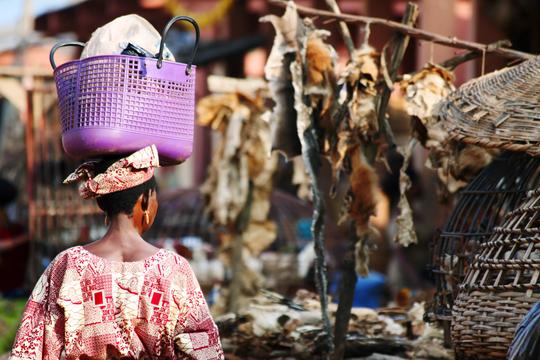
Dig deeper into culture-packed West Africa
The vibrant nations of Benin, Ghana, and Togo are an enriching trio — find out how to immerse yourself in their very best places to visit
Renowned as the birthplace of the Vodun (Voodoo) religion, Benin offers a fascinating exploration of spiritual traditions, particularly in the town of Ouidah, where you can visit the historic ‘Route of the Slaves’ and the Door of No Return memorial. It’s a country rich in culture and famous for its eclectic arts scene, colourful festivals, and traditional markets — with an added side of secluded beaches, wildlife-filled marshes, and much more.
Visa requirements may change, so for the most up-to-date information we recommend using our Entry Requirements tool. Or, check the Beninese embassy website in your country of departure.
Recommended vaccinations for Benin include hepatitis A, cholera, polio, rabies, meningitis, and yellow fever. However, as advice often changes, you can check out our Entry Requirements tool for the most up-to-date details on vaccination requirements.
Due to its location near the equator, Benin tends to have a hot and humid climate all year round. Temperatures tend to range from 18 to 35°C (64.4 to 95°F), though in the north of the country, it can get even hotter. The Harmattan winds blowing from November to March tend to bring very hot and dry conditions — bring moisturizer and lip balm!
There are two rainy seasons in the south, from April to mid-July, and from mid-September to late October; and a rainy season in the north from June to early October. June tends to bring the most rainfall — up to 334 mm (13.15 inches) in some cases.
The best time to visit Benin tends to be during the dry season running from November to February or March. Temperatures range from 25 to 30°C (77 to 86°F) in most areas, with low humidity and little to no rainfall. The weather is ideal for outdoor activities without the risk of heavy rain in the rainy season (March to October) disrupting plans or roads being washed away.
Tipping in Benin is not strictly required but it’s appreciated for good service, especially in tourist areas, hotels, restaurants, and for guides too. While it's not a formal practice, small tips can go a long way in showing appreciation for quality service. 5 to 10% in restaurants or the service industries is a great ballpark figure.
Tipping your G Adventures CEO is also very much appreciated. The amount is entirely a personal preference; however, as a guideline USD$ 20-30 per person, per week is our recommendation in the region. If you felt your CEO did an especially outstanding job, any additional amount is always welcome.
Internet access in Benin is generally available in towns and cities, but the quality and reliability can vary depending on where you are. Some hotels and cafes offer free Wi-Fi, but speeds may be slower than what you might expect in more developed countries. In rural areas and smaller towns internet access can be much more limited.
Yes — ATMs are widely available in major cities such as Cotonou, Porto-Novo, and Bohicon. Most accept international cards like Visa, Mastercard, and Cirrus. However, American Express and other less common cards might not always be accepted. If you’re heading out into rural areas, carry cash in case you can’t locate an ATM.
Benin is relatively tolerant towards LGBTQ+ people but LGBTQ+ rights are not fully recognized, and attitudes can still be conservative. It is safer to be discreet. G Adventures is committed to LGBTQ+ inclusion; find out more via our LGBTQ+ travel page.
Benin is multilingual. The official language is French, but many local languages like Fon, Yoruba, Bariba, Dahomey, Goun, and Aja are widely spoken.
No. Tap water is not safe to drink in Benin as it may be contaminated. Stick to bottled water which is widely available. All drinks provided on our tours, hotels, and restaurants are safe.
Benin is generally safe for travellers, though petty crime like pickpocketing happens in cities. Road safety can be an issue, and flooding may occur in the rainy season (May to October). G Adventures takes safety seriously; find out more via our Travel Safety page.